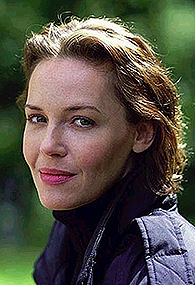 Connie Nielsen ('The Situation')
Connie Nielsen ('The Situation')
'Caught Within the Afterglow of the Latest Nielsen Rating'
Connie Nielsen was born in Copenhagen, Denmark. At the age of ten, Nielsen moved with her family to a small seaside village named Elling in Frederikshavn. Her first acting experience came when she was fifteen years old, in a cabaret written by her mother. When she turned eighteen, she traveled to Paris, Rome, Milan, South Africa and New York in order to pursue her acting career. She studied and worked to support herself during her travels.
After a few minor roles, Nielsen's big break came in 1997 with the movie 'Devil's Advocate,' starring Al Pacino and Keanu Reeves. In 2000, she portrayed Princess Lucilla in Ridley Scott's Academy Award-winning 'Gladiator' (2000) where she starred opposite Russell Crowe and Joaquin Phoenix. She has since starred in a few notable American films, including 'Mission to Mars' (2000), 'One Hour Photo' (2002), 'The Hunted' (2003), 'Basic' (2003), 'The Great Raid' (2005), and 'The Ice Harvest' (2005). In 2004, she starred in the Danish movie, Brodre, directed by Susanne Bier.
This past June (2006), Nielsen appeared in six (6) episodes of 'Law & Order: Special Victims Unit' as detective Dani Beck. She filled in for Mariska Hargitay who was on maternity leave at the time of taping.
Here in 2007, Shadow Distribution is proud to present the US theatrical release of 'THE SITUATION,' a film by Philip Haas, starring Nielsen, Damian Lewis (BAND OF BROTHERS), and Mido Hamada.
Combining elements of thriller, romance, and war movie, 'THE SITUATION,' set exclusively in Iraq, and the first U.S. feature film to deal with the occupation, dramatizes one of the countless human stories that lie behind the headlines of the current war.
When a group of American soldiers throw an Iraqi boy off a bridge in Samarra, the incident sets off a chain of events that exposes the deep rifts among the Iraqis in Samarra, and results in yet another cycle of violence between the insurgents and the corrupt Iraqi police. Anna (Connie Nielsen) is an American journalist who decides to write a story about the assassination of an Iraqi leader whom she admires.
At the same time, she is pulling away from a relationship with Dan (Damian Lewis), an American intelligence official, who thinks the war can be won with hearts and minds, and towards Zaid (Mido Hamada), a young Iraqi photographer who shows her there are people, rather than sides, in the conflict. As she tries to make sense of the half-truths of Iraq, she finds herself in the middle of a love triangle, and in the midst of a dangerous situation, set against a thick web of alliances, agendas, and reverses.
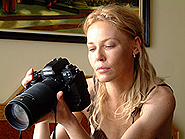 'The Situation':
'The Situation':
How did this film first entice you in as an actor? "On the day I read the script called 'The Situation' I felt a sort of relief. I had been frustrated for months, or more precisely, years, about the mystery of who the Iraqis even were."
"First, they were a People Oppressed by a Murderous Tyrant and his Sons (who were cruel and outrageous but nevertheless very popular with French and American foreign policy officials). Iraqis were a People that Suffered; even the ones who supported the Tyrant sometimes ended up dead. Among the Suffering Iraqis, there were also a certain amount of Kurds who were killed by gas and other horrible agents. I remember a picture that went around the world, a dead father half embracing his asphyxiated child, a white powder covering their clothes and faces, and the tiny mouth still pursed as if in the act of calling out."
"The Kurds had no land and were repressed in other surrounding countries as well. So, I knew there were Kurds and Fathers and Sons and dead people, and one crazy ruling family. I knew there was oil and desert and grubby-looking third-world housing but not much more, and I wanted to know more than what these images on TV seemed to promise yet never delivered."
"Articles were written all over about Saddam and Uday and his brother. - And about some of the other unsavory mustachioed men around the tables in the palaces. But the Iraqis, who were they? Why did they not rebel, organize and rise up en masse against those gangsters? Where were the co-op’s and associations the families of the desaparacidos in South America had organized? Where were the songs and the Mercedes Sosa’s and Violeta Parra’s? Why didn’t I hear about the poets, writers and political scientists dreaming up a new tomorrow in books that had to be smuggled out and published only in the West? Had Saddam killed them all? The only things I came across were the quotes of Ahmed Chalabi who, it seemed, didn’t ever really live in Iraq and had been a bit tainted in some banking scandal. And wasn’t he on someone’s payroll?"
"Then Bush Senior went in to save the oil of the Kuwaiti people who apparently were neighbors to, - and partners in a dispute of land and access to sea routes with, the Iraqi's. Some Iraqi's were encouraged by the Tyrant's setback and rose up against him. But none followed. No one had their back. They died, I thought, surprised that Bush would help the Kuwaiti but not the good Iraqi's (I mean, they had oil too, once they got rid of Saddam). Then there was a no-fly zone and the Kurds were happy; they started creating the country the British and the French had forgotten to give them after the First World War. There was a lot of money because somehow somebody figured out how they could benefit from yet another problem the Tyrant had created for the Iraqis: There were sanctions due mostly to the braggadocio and inflated pride of the Tyrant who, despite his defeat, continued to posture and behave in a menacing way. That was maybe the only way he knew how to live. Otherwise someone would surely kill him."
"Then Bush Junior went in and, one way or another, got rid of him. He also managed to make a mess of it from the get-go. Not many outside the States seemed to believe that Saddam had nuclear weapons, even though Saddam himself strangely seemed to corroborate the accusation by his aggressive behavior towards the inspectors, while proclaiming to the world he had none. There were weird documents about Uranium for Iraq through Niger that had been provided, it seemed, by the Italian secret service and that the CIA took very seriously and for months rumors flew and meetings were held all over Washington, New York and London. The International Agency of Atomic Energy got tired of all the fired up emotion and demanded to see what the fuss was about. And some months later they finally got to see the famous papers. Once they got a look-through though, the IAEA disclosed how dismayed and confused they were that the CIA had been unable to unmask them as the (very) obvious fakes the IAEA immediately discovered them to be."
"I saw a photocopy of one of the documents in a magazine story that mentioned the Italian Secret Service’s role in discovering them. It seemed very frail, that paper. I thought of Sindona and Contrada and the CIA and Gladio. All that posturing and alarum all over the world for this cut and paste job, and some unprovable ‘reports’ and dossiers, and yet soldiers were streaming to the Persian Gulf. Mr. Tariq Aziz took a desperate stand in the UN."
"The faces on television didn’t mention anything we could buy, and asked us to accept a war on their bare faces and proffered word. In the end, mostly people seemed to buy the reductive idea of getting rid of Saddam, if anything just to be free of his bizarre behavior and the endless repetition of the “Saddam in Hunting Costume firing his shotgun into the air” jingle on TV. I never bought that argument, simply because I like things to be thorough: The US government and the UN would then finally have to sign on to never have any dealings with any of the other strongmen and dictators in the rest of the world, and to rid the world of them. What would be the point of throwing just one out of class if there were loads of others still left inside to operate freely in the classroom?"
"And so we went to war. Divided and full of mistrust. Surrounded by propaganda and euphemisms that threatened any sort of meaningful discussion. And so we also really stopped discussing and each retreated to their side, and the sides talked among themselves, creating inner dialogues shielded from reality checks that further threatened to dilute the meaning of Reason."
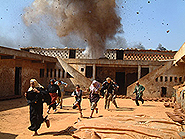 "And bombs fell, people died, and all their earthly labors evaporated into thin air. Then we were supposed to see repairs starting, new leaders emerging and a new system of self-governance installed. But it seemed more complicated than that. I started to hear about Mokhtada and about Sunnis and Shiite’s and Kurds, and Clans and Tribes and Families. But I felt I just couldn’t figure those Iraqis out. They bombed each other now. - As well as the Americans (it seemed the Iraqis didn’t believe we were only in it for “democracy in the Middle East”). They hadn’t had enough of violence yet. Revenge seemed sweet despite the sickening sight of death everywhere. They didn’t seem to formulate any answers to all the puzzles. Mostly all we saw and heard were screams of grief and rage. On TV. I was confused and frustrated about being confused."
"And bombs fell, people died, and all their earthly labors evaporated into thin air. Then we were supposed to see repairs starting, new leaders emerging and a new system of self-governance installed. But it seemed more complicated than that. I started to hear about Mokhtada and about Sunnis and Shiite’s and Kurds, and Clans and Tribes and Families. But I felt I just couldn’t figure those Iraqis out. They bombed each other now. - As well as the Americans (it seemed the Iraqis didn’t believe we were only in it for “democracy in the Middle East”). They hadn’t had enough of violence yet. Revenge seemed sweet despite the sickening sight of death everywhere. They didn’t seem to formulate any answers to all the puzzles. Mostly all we saw and heard were screams of grief and rage. On TV. I was confused and frustrated about being confused."
"Then I read the script. Here were Iraqis and Americans, speaking without couched euphemisms and outside of official, scripted propaganda. Above the screams and the grief, Iraqis were heard speaking from within the walls of their compounds and their culture, with references, witticisms and jokes that expressed a unique voice: an Iraqi voice. There were suspicious cab-drivers, xenophobic children, orphaned Communist Christians (!) no less; grandmothers who don’t dare to speak on the phone for fear Saddam’s security forces are still listening in; a sophisticated ex-Baathist party official who is now stranded in lines at the gas stations when not meeting with American intelligence officials, begging for a paid position in some faraway country; and a Sheikh who has adapted to democracy by having himself elected Mayor instead, yet uses the local police force as his own armed militia. However disparate in situation and geography, they were all connected to each other in a web of warring interests that amply described the mess the Americans had landed themselves in, and that they were responsible for creating too."
"Here was a collection of shrewd wheeler-dealers who seemed to operate very well in a fog of misinformation that the Americans seemed helpless to penetrate, stranded as they were, in a bog of lingual, cultural and physical isolation from the rest of Iraq. “Outside where, Dan? Outside the Green Zone? The rest of Iraq?” – was one of the exasperated lines, my character, Anna, throws at her off-and-on boyfriend, an American Intelligence official. The fact that my character, a journalist, was sleeping with someone who had a vested interest in controlling information, was, in my opinion, a pleasantly ironic nod at something that had bothered me since the beginning: So much of our information seemed to come directly from “embedded” sources. I had always grinned sort of wryly at the mere use of the word, and yet been surprised that no one found it to have connotations to a more meretricious sort of ‘bedding’."
"The script also had the bright idea to start out with an act of American brutality. I liked this because it helped me deal with another aspect of war that had haunted me and that we had treated somewhat in “Brothers”: The soldier who gives into the darkness (extreme violence) he is asked to wield daily as a weapon and yet is supposed to remain unaffected by."
"Abu Ghraib, and reported instances of straight out murder had jarred, I think, us all. The incredible ‘accidental shootings’ at road-blocks and other mass-deaths in villages due to mistaken bombing-targets had also helped further the ill-will that reigned against the Americans in the occupied (liberated) territories. The unchecked (because un-punished) power of the single soldier started to merge in my mind, with the specter of un-named officials processing suspected terrorists without the checks and balances of judicial guarantees. These were pressing worries about the state of our own democracies, the role of impunity in letting things reel further out of control, and a lack of civilian oversight in matters of justice. Simply put, the opening incident gave me a chance to digest some of my horror at the headlines emanating from Iraq and Afghanistan. The fact that it was based on a real incident the writer Wendell Steavenson had reported on, bore it home completely."
"The script had a certain roughness that I felt made it truer. Wendy had had little time to order her experiences in Iraq and it therefore bore the mark of something that came from her gut. She had a quiet-ness to her that intimated to me the observer within. The observer in turn produced shrewd and interesting ways of slowly revealing the web of vested interests through the gradual reveal of the vanities and values (or lack thereof) of the characters."
"Some of the incidents turn out to be the results of banal desires and minds (a source is killed ultimately because he refuses to give his daughter in marriage to a suitor; personal considerations are involved in the decision to attack the compound of an insurgent) and the banality both exasperates and renders it all more tragic."
Filming the Iraq war scenes in Morocco, was it beyond hot and uncomfortable over there for you? Especially as it seems you were always wrapped in traditional clothing? Was there any trouble encountered whilst over there filming; internal or external to the sets? "Filming in Morocco was interesting because it was a Muslim country and yet ruled by a secular system of King and parliament, not entirely democratic. I was mostly aware of a certain level of joblessness and some economic depression going on, while at the same time observing much construction and the usual juxtaposition of ancient and brand new in developing countries. We felt free to do as we wanted and didn’t feel any interference whatsoever."
"Our crew was almost entirely Moroccan and most of the actors were Muslims from all over the map. The discourse was very cordial and we all constantly tried to reach consensus in the most diplomatic ways possible. The Muslim actors were relieved to be playing real people versus sneering terrorists. At times the robes got really annoying, hot and sticky, but then again it just suited my character’s situation so, I ran with it. I tried really hard to have respect for local mores and the more conservative standards of dressing in my time off. I visited with my driver, Mjid’s family and enjoyed some wonderful moments with them all."
"The sisters, daughters and cousins took me out shopping in the local market/mall, where I bought spices, silver tea service and rough sapphires. They were expert hagglers and felt none of the guilt the tourists (and I) tend to feel in those situations. I also saw the differences between Mjid’s sister, and her 16-year-old daughter. The sister, a working dentist and very educated woman, was lamenting that her daughter still refused to wear a headscarf and a robe over her jeans and t-shirt. There was absolutely nothing flirtatious or girly about the teenager. She was shy and bookish and wore glasses and braces. She smiled fleetingly and exasperatedly at our conversation but never offered any objections. Instead, she seemed resolved to resist the push in a passive and respectful refusal to change her clothing."
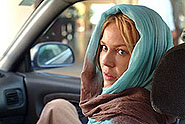 "I almost regretted wearing the long boy’s kaftan over my jeans, and the voluminous scarf I continued to wear off and on set. It would have been a silent support of the girl’s right to choose. As it was, I was as neutral as I could be, and maybe it helped us all feel a little more connected despite our differences. Later they served meal after meal, and helped me master the courtesies involved in sharing one big plate (left or right hand makes the difference between insulting someone, not to mention banging elbows). The hospitality and kindness of the various homes cannot be overstated: it was phenomenal."
"I almost regretted wearing the long boy’s kaftan over my jeans, and the voluminous scarf I continued to wear off and on set. It would have been a silent support of the girl’s right to choose. As it was, I was as neutral as I could be, and maybe it helped us all feel a little more connected despite our differences. Later they served meal after meal, and helped me master the courtesies involved in sharing one big plate (left or right hand makes the difference between insulting someone, not to mention banging elbows). The hospitality and kindness of the various homes cannot be overstated: it was phenomenal."
Come the end of filming, and once back in America and within the confines of your home, what new thoughts on the war in Iraq are now part of your every day thoughts that once had perhaps not been? "Right now, I feel that the madness of sectarian war is taking over more and more regions in the Middle East, not to mention a certain trigger-happy attitude to conflict in general (Palestinians among themselves) and that to send more troops seems almost ridiculous. If Arab forces don’t start to act in their own best interests and start to forgo clannish interests, corruption and the continuous stifling of public debate, what role is there for American and European troops?"
"They become pawns in a sinister game where each side of the conflict can always blame the presence of “imperialist troops” for their own armed participation in that conflict. If the West has no moral standing in the area, their presence can have no positive effect and they should leave. If we are talking about peacekeeping, then there are other and very different means to setting up such a force."
Other Movie Roles:
You choose such meaty, descriptive film/TV roles each time. So just what is your personal criteria for undertaking a role and is there a role that you wish you had taken, but for whatever reason at the time turned down? "My personal criteria is to be either moved by a script or character, or that my curiosity be piqued by either. When I have chosen to turn down a role, I have usually been right. There is none that I regret having turned down. It seems sometimes harder when you say yes."
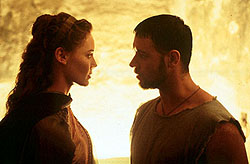 Did your role as Lucilla in the internationally-acclaimed, Academy Award-winning epic 'Gladiator' change your life (personally/professionally) in any way, perhaps? "'Gladiator' changed many things, both personally and professionally, but none in ways that I in any way regret. I did get a very hasty introduction into how the media and Hollywood collaborate and for a little while was a bit disappointed about the realities of that."
Did your role as Lucilla in the internationally-acclaimed, Academy Award-winning epic 'Gladiator' change your life (personally/professionally) in any way, perhaps? "'Gladiator' changed many things, both personally and professionally, but none in ways that I in any way regret. I did get a very hasty introduction into how the media and Hollywood collaborate and for a little while was a bit disappointed about the realities of that."
Why did it take you up until 2004 to make your Danish film debut, in 'Brothers'? "I was busy working outside of Denmark, and as a result of a very inconvenient sense of both humility and privacy that I am cursed with, no one there knew I was Danish. Once they figured it out, they started sending me scripts, which I then proceeded to subject to my usual criteria."
'Law & Order: SVU':
Is your role on 'SVU' a recurring one or was it simply to temporarily fill in for Mariska Hargitay whilst she was on maternity leave? How much fun was working on that set with such a powerhaus cast? "I had a great time doing L&O also in part because I realized how lucky I was to be able to fill in for a little while,
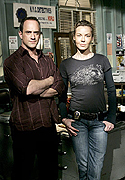 without having to commit completely to a series, with all the hard work and tough schedule that that implies."
without having to commit completely to a series, with all the hard work and tough schedule that that implies."
Your heavy accent in 'SVU' was different from the one used on 'The Situation.' Purposeful or requested? "What accent? – just kidding, never mind! Yes, the producers of L&O didn’t want me to work on an accent and instead preferred to have my own. In 'Situation' instead, I used a kind of accent I have noticed that some constant travelers have, which is a weird neutral one, with a slight pidgin in it… whatever. Never mind. I hate to say what I do."
Her Love, Lars Ulrich:
Being that your partner in real life is Lars Ulrich, I'm wondering if you liked Metallica's music before falling in love with their drummer?! "I knew only the song ST Anger that I had heard on MTV once. I had met Lars briefly at a drinks party once and had come away thinking what a nice guy he was. But Music didn’t enter into it, no."
On Being Pregnant:
With motherhood just around the corner for you (congratulations), how much will the birth of your second child perhaps change your (film) career choices this time around? "Thank you. I’d like to score some brownie points with my step-kids and my new son by appearing in a movie they can actually see!"
And finally, we wondered if Exclusive Magazine's love for Penguins was also felt by Connie?! "Are you kidding? Are u guys really trying to be cute? I’m promoting a movie about war for God’s sake! Or not…
Fine (who cares and why not) ... Penguins are uncommonly cute, not least because they are more clumsy looking when out of water than me at my most pregnant. They waddle and snigger and look kinda rapt when they are really just looking at stuff."
Back To Archives

